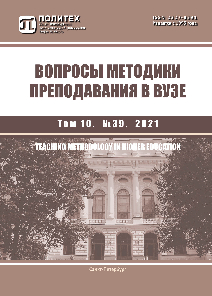System of modifiable polymodal exercises for foreign language education at a non-linguistic university
The article is devoted to finding ways to solve actual problems in the theory of exercises (tasks) and the practice of their use in foreign language education at non-linguistic universities, related to understanding the essence of exercises in a foreign language educational process at a university, determining their nature, strengthening their systematic character, motivating and stimulating functions, as well as increasing their adaptability. Therefore, the task of this article is, firstly, to determine the nature and parameters of exercises designed to form foreign language communicative competence in students of a non-linguistic university and have a high systemic, motivating and stimulating function, adaptability, and secondly, to present a system of such exercises. To solve this task, the following research methods were used: the study of theoretical sources, analysis, generalization, modeling. As a result, the authors conclude that the solution of these problems is facilitated by the implementation of a system of modifiable polymodal exercises in the foreign language education of non-linguistic students. The exercises are aimed at developing / improving speech habits and developing speech skills through the implementation of various combinations of receptive, reproductive and productive actions to solve a professionally-oriented speech-thinking task in a problem situation. The system of exercises includes reproductive (reactive-written-oral, reactive-oral-written types), receptive-productive (reactive-written-oral, reactive-oral-written types), productive-receptive-productive (written-reactive-oral, orally -reactive-written types) types. Each of the types of exercises is represented by variants - reproductive, search-reproductive, reproductive-search, search-creative and creative. The variants have three versions: a) exercises performed with memos and supports, b) exercises performed without memos and supports, and c) exercises performed without memos, but with supports. Examples of the exercise formulations in the German language tutorial are provided. The material of the article will be useful to those who are developing a practical course in the subject "Foreign Language" for non-linguistic students.



